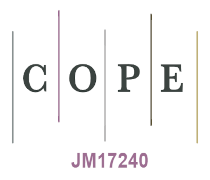Job characteristics and job satisfaction
DOI:
https://doi.org/10.18778/1427-969X.22.02Keywords:
job characteristics, job satisfaction, job/work designAbstract
The aim of the research was to analyse the relationship between job characteristics and job satisfaction. The base for the research was the Job Characteristics Model by Hackman and Oldham (1980) as well as numerous verification studies which pointed to the need to consider three groups of work characteristics: motivational, social, and contextual ones. The study sample comprised 375 persons, aged from 19 to 64, rep resenting different industries.
The obtained results have confirmed that the highest relationship with employees’ satisfaction is displayed by the so-called “social characteristics”. At the same time, the percentage of job satisfaction variance explained by the features of work has turned out to be negligible, which indicates the need to explore different factors affecting job satisfaction, and to take into account some more advanced models and a larger set of variables.
References
Argyle M. (2005). Przyczyny i korelaty szczęścia. W: J. Czapiński (red.), Psychologia pozytywna. Nauka o szczęściu, zdrowiu, sile i cnotach człowieka (163–203). Warszawa: Wydawnictwo Naukowe PWN.
Google Scholar
Aronson E., Wilson T. D., Akert R. M. (2006). Psychologia społeczna. Warszawa: Wydawnictwo Zysk i S-ka.
Google Scholar
Blikle A. C. (2016). Doktryna jakości. Rzecz o turkusowej samoorganizacji. Warszawa: Andrzej Blikle.
Google Scholar
Brief A. P. (1998). Attitudes in and around organizations. Thousand Oaks: SAGE.
Google Scholar
Brief A. P., Weiss H. M. (2002). Organizational behavior: Affect in the Workplace. Annual Review of Psychology, 53, 279–307.
Google Scholar
Campion M. A. (1988). Interdisciplinary approaches to job design: A constructive replication with extensions. Journal of Applied Psychology, 73(3), 467–481.
Google Scholar
Campion M. A., Thayer P. W. (1985). Development and field evaluation of an interdisciplinary measure of job design. Journal of Applied Psychology, 70(1), 29–43.
Google Scholar
Crites S. L., Fabrigar L. R., Petty R. E. (1994). Measuring the affective and cognitive properties of attitudes: Conceptual and methodological issues. Personality and Social Psychology Bulletin, 20, 619–634.
Google Scholar
Dawis R. V., Lofquist L. H, Weiss D. J. (1968). A theory of work adjustment (a revision). Minnesota Studies in Vocational Rehabilitation, 23.
Google Scholar
Furnham A. (2000). Work in 2020. Prognostications about the world of work 20 years into the millennium. Journal of Managerial Psychology, 15(3), 242–254.
Google Scholar
Furnham A. (2005). The psychology of behavior at work: The individual in the organization. Hove and New York: Psychology Press.
Google Scholar
Gonera K., Olszak-Dyk E. (2016). Świadome zarządzanie marką pracodawcy – studium przypadku. Prace Naukowe Uniwersytetu Ekonomicznego we Wrocławiu, 419, 43–55.
Google Scholar
Grand J. A., Braun M. T., Kuljanin G., Kozlowski S. W. J., Chao G. T. (2016). The dynamics of team cognition: A process-oriented theory of knowledge emergence in teams. Journal of Applied Psychology, 101, 1353–1385.
Google Scholar
Hackman R. J., Oldham G. R. (1975). Development of the job diagnostic survey. Journal of Applied Psychology, 60(2), 159–170.
Google Scholar
Hackman R. J., Oldham G. R. (1980). Work design. Massachusetts–Menlo Park, CA–London– Amsterdam–Don Mills, Ontario–Sydney: Addison – Wesley Publishing Company Reading.
Google Scholar
Hauk M. (2007). Reaktywność a wybór zawodu. Niepublikowana praca magisterska. Łódź: Uniwersytet Łódzki.
Google Scholar
Hauk M. (2014). Kwestionariusz Cech Pracy – opracowanie polskiej wersji narzędzia do badania cech pracy i środowiska zawodowego. Wstępne wyniki badań. Acta Universitatis Lodziensis. Folia Psychologica, 18, 129–145.
Google Scholar
Herzberg F., Mausner B., Snyderman B. B. (1959). The motivation to work. New York: Wiley and Sons.
Google Scholar
Holland J. L. (1997). Making vocational choices: A theory of vocational personalities and work environment. Odessa: Psychological Assessment Resources.
Google Scholar
Humphrey S. E., Nahrgang J. D., Morgeson F. P. (2007). Integrating motivational, social, and contextual work design features: A meta-analytic summary and theoretical extension of the work design literature. Journal of Applied Psychology, 92(5), 1332–1356.
Google Scholar
Iroson G. H, Smith P. C., Brannick M. T., Gibson W. M., Paul K. B. (1989). Constitution of a Job in General Scale: A comparison of global, composite and specific measures. Journal of Applied Psychology, 74, 193–200.
Google Scholar
Jaros R. (2009). Nastrój wywoływany przez pracę i jej składniki. Rozprawa doktorska. Bydgoszcz: Uniwersytet Kazimierza Wielkiego w Bydgoszczy.
Google Scholar
Jonze J., East H. (2013). Employer branding in human resources management. The importance of recruiting and retaining employees, www.diva-portal.org [dostęp 2.03.2016].
Google Scholar
Judge T. A., Bono J. E. (2001). Relationship of core self-evaluations traits – self-esteem, generalized self-efficacy, locus of control, and emotional stability – with job satisfaction and job performance: A meta-analysis. Journal of Applied Psychology, 86(1), 80–92.
Google Scholar
Judge T. A., Heller D., Mount M. (2002). Five-factor model of personality and job satisfaction: A meta-analysis. Journal of Applied Psychology, 87, 530–541.
Google Scholar
Kozłowski M. (2013). Employer branding. Budowanie wizerunku pracodawcy krok po kroku. Warszawa: Oficyna Wolters Kluwer business.
Google Scholar
Krasnowa A. (2016). Derekrutacja a budowanie marki pracodawcy. Prace Naukowe Uniwersytetu Ekonomicznego we Wrocławiu, 430, 185–194.
Google Scholar
Kunin T. (1955). The construction of new type of attitude measure. Personnel Psychology, 8, 65–77.
Google Scholar
Laloux F. (2015). Pracować inaczej. Nowatorski model organizacji inspirowany kolejnym etapem rozwoju ludzkiej świadomości. Warszawa: Studio Emka.
Google Scholar
Lipińska-Grobelny A. (2013). Pracownik portfolio – analiza współczesnej wieloetatowości. Organizacja i Kierowanie, 2(155), 133–143.
Google Scholar
Lipińska-Grobelny A. (2016). Wielopraca a zadowolenie z różnych sfer życia – analiza różnic płciowych, zawodowych i wiekowych. Medycyna Pracy, 67(3), 385–395.
Google Scholar
Locke E. A. (1976). The nature and causes of job satisfaction. W: M. D. Dunnette (ed.), Handbook of industrial and organizational psychology (1297–1349). Chicago: Rand McNally.
Google Scholar
Morgeson F. P., Humphrey S. E. (2006). The Work Design Questionnaire (WDQ): Developing and validating a comprehensive measure for assessing job design and the nature of work. Journal of Applied Psychology, 91(6), 1321–1339.
Google Scholar
Oldham G. R., Hackman R. J. (1981). Relationships between organizational structure and employee reactions: Comparing alternative frameworks. Administrative Science Quarterly, 26(1), 66–83.
Google Scholar
Oldham G. R., Hackman R. J. (2010). Not what it was and not what it will be: The future of job design research. Journal of Organizational Behavior, 31(2/3), 463–479.
Google Scholar
Parker S. K., Wall T. D., Cordery J. L. (2001). Future work design research and practice: Towards an elaborated model of work design. Journal of Occupational & Organizational Psychology, 74(4), 413–440.
Google Scholar
Patterson F. (2001). Developments in work psychology: Emerging issues and future trends. Journal of Occupational & Organizational Psychology, 74, 381–390.
Google Scholar
Ratajczak Z. (2006). Psychologiczne aspekty funkcjonowania współczesnych organizacji. W: Z. Ratajczak, A. Bańka, E. Turska (red.), Współczesna psychologia pracy i organizacji. Katowice: Wydawnictwo Uniwersytetu Śląskiego.
Google Scholar
Ratajczak Z. (2007). Psychologia pracy i organizacji. Warszawa: Wydawnictwo Naukowe PWN.
Google Scholar
Roznowski M., Hulin C. (1992). The scientific merit of valid measures of general constructs with special reference to job satisfaction and job withdrawal. W: C. J. Cranny, P. C. Smith, E. F. Stone (eds.), Job satisfaction (123–163). New York: Lexington Books.
Google Scholar
Salas E., Chen G., Kozlowski S. W. J. (2017). A century of progress in industrial and organizational psychology: Discoveries and the next century. Journal of Applied Psychology, 102(3), 589–598.
Google Scholar
Scarpello V., Campbell J. P. (1983). Job satisfaction: Are all the parts there? Personnel Psychology, 36, 577–600.
Google Scholar
Schultz D. P., Schultz S. E. (2002). Psychologia a wyzwania dzisiejszej pracy. Warszawa: Wydawnictwo Naukowe PWN.
Google Scholar
Szymańska A., Kupczyk T., Kubicka J. (2016). Definiowanie pojęcia employer branding przez pracowników przedsiębiorstw wyzwaniem dla Human Resources Management. Prace Naukowe Uniwersytetu Ekonomicznego we Wrocławiu, 429, 280–289.
Google Scholar
Wingerden J. Van, Derks D., Bakker A. B. (2015). The impact of personal resources and job crafting interventions on work engagement and performance. Human Resource Management, 56(1), 51–67.
Google Scholar
Wojtaszczyk K. (2012). Employer branding czyli zarządzanie marką pracodawcy. Uwarunkowania, procesy, pomiar. Łódź: Wydawnictwo Uniwersytetu Łódzkiego.
Google Scholar
Wrzesniewski A., Dutton J. E. (2001). Crafting a job: As active employees revisioning crafters of their work. The Academy of Management Review, 26(2), 179–201.
Google Scholar
Zalewska A. (2001). Arkusz Opisu Pracy O. Neubergera i M. Allerbeck – adaptacja do warunków polskich. Studia Psychologiczne, 39, 197–217.
Google Scholar
Zalewska A. (2003a). Dwa światy – emocjonalne i poznawcze oceny jakości życia i ich uwarunkowania u osób o niskiej i wysokiej reaktywności. Warszawa: Wydawnictwo Szkoły Wyższej Psychologii Społecznej ACADEMICA.
Google Scholar
Zalewska A. (2003b). „Skala Satysfakcji z Pracy” – pomiar poznawczego aspektu zadowolenia z pracy. Acta Universitatis Lodziensis. Folia Psychologica, 7, 49–61.
Google Scholar
Zalewska A. (2004). Reaktywność i system wartościowania a zadowolenie z pracy w nowym miejscu pracy. W: H. Skłodowski (red.), Psychologia w zarządzaniu – dydaktyka, badania, sukcesy (397–413). Łódź: Społeczna Wyższa Szkoła Przedsiębiorczości i Zarządzania.
Google Scholar
Zalewska A. (2009). Wiek, płeć i stanowisko pracy a zadowolenie z pracy. Psychologia Jakości Życia, 8(1), 1–20.
Google Scholar
Downloads
Published
How to Cite
Issue
Section
License

This work is licensed under a Creative Commons Attribution-NonCommercial-NoDerivatives 4.0 International License.









